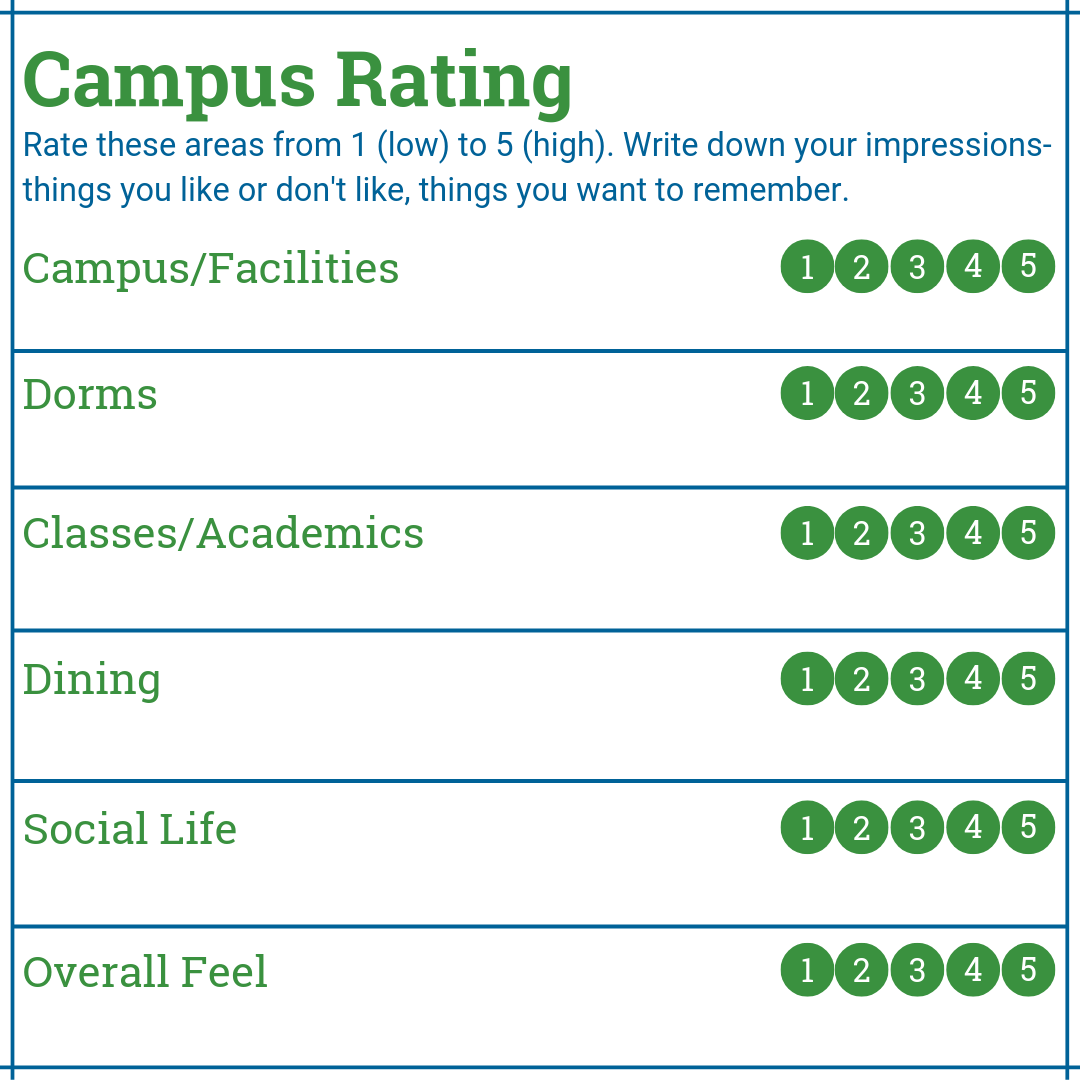College Planning
The College Campus Tour Checklist
Visiting a college campus is a great way to get more information about a school and help you decide if it’s a good fit for you. A campus tour helps you get a sense of what a college—and life at that college—is like.
Things to Do Before a Campus Tour
- Before you visit a college campus, call the admissions office to make a reservation for an information session and/or a guided campus tour
- Ask if the school has recommendations on what to wear for your visit
- If the school you’re interested in touring is far away, you can ask about hotels in the area and parking passes
- Think about the best time to visit a campus—late summer and early September before senior year, and/or summer and spring breaks
Things to Do on a Campus Tour
Gather Important Information
- Pick up brochures, financial aid forms, and the campus map.
- Try to sit at the back of a classroom that interests you. If classes aren’t in session, you can still stop in a classroom or lecture hall to get a sense of the environment.
- Meet a professor who teaches a course you’re interested in.
- Talk to students about their experience.
- Take part in a group information session at the admissions office, or if possible, schedule a one-on-one meeting with an admissions officer.
- Talk to admissions officers, tour guides, professors, or current students.
- Ask them to share their contact information so you can send follow-up questions.
- Take lots of notes and track your visits with this campus visit scorecard:

Get a Feel for Student Life on Campus
- Visit the dorms, dining hall, fitness center, library, career center, bookstore, and other campus facilities
- Talk to current students about their transition from high school to college, college courses, and life outside the classroom
- If you’re planning to play sports in college, try to meet with coaches for the sports you’re interested in
- Walk or drive around the community surrounding the campus
- Check if there’s on-campus or off-campus transportation available to students
- Ask current students how they travel home for breaks
- Learn about campus services for students, which may include:
- Residential services
- Counseling
- Health centers
- Religious centers
- Financial aid office
- Information technology support
- Career centers
- Commuter services
- If you’re an Indigenous student, you can download the College Board Indigenous College Planning Guidebook to find out about:
- Indigenous clubs/organizations
- Native centers
- Tribal liaison office
- Hear what’s happening on campus and what’s on students’ minds via campus media outlets
- The college’s social media accounts
- Student-run newspaper, other publications, and blogs
- College radio station
Questions to Ask on a Campus Tour
- What are the best reasons to go to this college?
- What’s it like to go from high school to college?
- What do you do in your free time? On the weekends?
- What do you love about this college?
- Why did you choose this college?
- What is it like to live here?
- What does the college do to promote student involvement in campus groups, extracurricular activities, or volunteering?
- Are there special interest student organizations?
- What are the housing options?
- Are first-year students required to live on campus?
- Do professors, graduate students, or juniors and seniors mentor students?
- Are there research opportunities for students to work with professors?
- What’s the graduation rate?
- For the majors I’m interested in, how many years do students usually take to get their degree?
- Are there work-study programs and part-time jobs available?
You can read more on why students should consider visiting colleges, and use this campus visit checklist to help you find a college that’s a good fit.
If you can’t visit a college campus in person, there are many ways to learn about schools online:
- Check the school’s website to see if virtual tours are available online
- Watch college tours led by our partner, College Advising Corps, on College Board Instagram highlights
Remember, you don’t need to check off everything on this list to decide if a school is a good fit—focus on what’s most important to you to find a college that fits you academically, financially, and socially.
Visit bigfuture.org for more free, comprehensive college planning resources.

